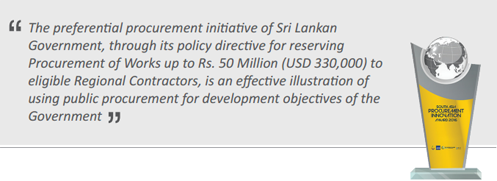Feature Stories
- How Bangladesh bridged the gap between amateur and professional in government procurement
- Rated Criteria: Promoting Value in World Bank Procurement
- Public Procurement Transformation in Bangladesh
- Achievement of Value for Money and Enhancement of Efficiency, Economy and Transparency in Procurement - Document Archive System
Archives
- End-to-End Procurement Planning and Maintenance System Integrated with Project MIS
- Application of Construction Milestones in Rural Road Contracts of Nepal
- Gross National Happiness Model for Pursuing Sustainable Public Procurement
- Government procurement is the basis of wide opportunities for enterprise development
- The Challenges of Procurement Training in a Fragile Country: the Afghanistan Experience
- When and How to Open Contracts: Transparency and Engagement through World Bank Projects
- Innovations and Best Practices in Procurement Processes of Disaster Recovery Projects
- World Bank Experts Discuss Global Procurement Trends and Armenia's e-GP system with the National Assembly
- Technology driving transparent and accountable public procurement reform in Bangladesh
- Prototype for Implementation of Framework Agreement via Blockchain
- Construction Project Planning and Management Capacity Building in India: A Wholistic Approach to Boost Infrastructure Development
- Zimbabwe: Public Procurement reform to catalyze greater transparency and development
- 15th Procurement, Integrity, Management and Openness (PRIMO) Forum
- e-Procurement World Map
- Preventing and controlling corruption: A modern approach to Procurement
- 6th South Asia Public Procurement Conference held in Thimphu, Bhutan
- South Asia Procurement Innovation Awards 2018 Announced
- Procurement iNET completes 5 years and new CPPP Fastest 100% Challenge Launched
- Risky Business: Does Debarring Poor Performers Mitigate Future Performance Risk?
- Global Procurement Summit 2019, New Delhi, India
- World Bank India launches Survey for International Civil Works Contractors
- World Bank launches new Complaints Module in Systematic Tracking of Exchanges in Procurement (STEP) System
- New Open Contracting Data Standard for e-Procurement Systems Launched
- Bangladesh's success in public procurement: Sustained reform really pays off
- The five drivers for improving public sector performance: Lessons from the new World Bank Global Report
- South Asia Public Procurement Innovation Awards 2018
- Conversation with Khaled Elarbi, President, High Authority for Public Procurement (HAICOP), Tunisia on the Digitalization of Public Procurement
- Breaking the glass ceiling in Africa: Rwanda E-Government Procurement System
- How government e-marketplace is revolutionizing procurement in India
- Ensuring Value for Money in Infrastructure Projects - The Botswana way
- Blockchain Lessons for Procurement
- Botswana’s Benevolent Move to Enhance its Procurement Profession
- Achieving Better Value for Money Using e-Auction for Procurement of Goods by Public Sector - A Success Case from DPDC
- Guide to Project Management and Contract Management (GPMCM) – New Approach to Improve Efficiency and Effectiveness of Procurement Outcomes
- Regional Winners of SAPIA 2017 participate in 8th International Public Procurement Conference (IPPC 8) Arusha, Tanzania
- The Future of Public Procurement in the Era of Digitalization
- World Bank Operations Procurement Helping Turkey to Procure a US$2 Billion Gas Storage Facility
- Unlocking Energy Efficiency Market in India - Through Innovative Procurement Business Model
- Getting value for money: Creating an automated market place for farmers in Pakistan
- Towards a Single Market for Public Procurement in Caribbean Small States
- Web-Based Online Evaluation Tool (e-Tool) for Procurement of Works by Royal Government of Bhutan
- Strengthening Health Sector Procurement System Offer Hopes for Universal Health Coverage in Nepal
- Morocco makes Strides in Modernizing its Public Procurement System— Operationalization of the Procurement Regulatory Body
- Innovations in Procurement Process and Selection that Lead to Improved Outcomes – Tenderers’ Database Management System
- Looking Back and Forward: The World Bank’s Procurement Framework
- Independent Monitoring and Evaluation of Contracted Health Services Leads to Improved Outcomes in Rural Areas of Afghanistan
- Fifth South Asia Region Public Procurement Conference brings focus on Procurement in Public Service Delivery
- 12 Procurement Innovations from South Asian Countries Celebrated
- Social Media is Improving Procurement in Lao PDR
- ASEAN meeting explores ways of professionalizing public procurement to meet development challenges
- Second International Training Program on the World Bank’s New Procurement Framework
- South Asia Procurement Innovations Award 2017 launched with Bigger and Better Prizes
- How to bid, finding opportunities, what makes a successful bid
- Pushing boundaries in procurement framework implementation
- Experience of Developing PPSD for the Assam Agribusiness and Rural Transformation Project (APART), India
- An Electronic Approach: Streamlining Georgia's Procurement
- South Asia Heads of Procurement Knowledge Exchange Program to U.S. Government Procurement Systems started
- 13th Procurement, Integrity, Management and Openness (PRIMO) Forum - a Documentary
- Bangladesh to strengthen public procurement with World Bank supported Project
- Establishment of Technology-Based Health Procurement and Supply Chain Management System, and Capacity Development in Tamil Nadu Medical Services Corporation
- Towards a Single Market for Public Procurement in Caribbean Small States
- Redefining Procurement as an Innovative and Collaborative Centre of Excellence for Best-in-Class Sourcing Solution
- India’s PowerGrid Endorsed for Alternative Procurement Arrangements by the World Bank
- Achieving Value for Money in Indonesia’s Geothermal Project
- Citizen Monitoring of Rural Roads Under Pradhan Mantri Gram Sadak Yojana (PMGSY), India
- Establishment of Grant and Service Contract Management Unit (GCMU) to Manage Contracting Out of Health Services in Afghanistan
- Procurement for Regional Development–Public Policy Initiative in Sri Lanka
- PPAF Community-Driven Development (CDD) Procurement Model, Pakistan
- Making Successful Procurement of IT Systems - An Experience from Vietnam
- Procurement Observatories continue to deliver in India
- Implementation of National e-GP System in Nepal
- Government e-Marketplace (GeM), India
- Africa High Level Public Procurement and Electronic Government Procurement Forums
- Development of Procurement Cadre as Part of Holistic Procurement Reforms in Bhutan
- Modernizing Public Procurement in Zimbabwe, one Step at a Time
- Citizen Engagement During Public Procurement Implementation in Bangladesh
- Winter 2017 Virtual Procurement, Integrity, Management, and Openness (PRIMO) Forum on Sanctions and Debarment Systems
- Close and Personalized Procurement Monitoring, Leading to Procurement Efficiency in Irrigation Sector in Fragile and Challenging Environments of Afghanistan
- Procurement Framework 2016 offers wider choices to ‘Go to Market’ based on PPSD
- Procurement Framework 2016 - Benefits, Status of Roll-out and M&E Arrangements
- PPSD offers Fit for Purpose Procurement Solutions
- Global Procurement Summit
- Fourth South Asia Region Public Procurement Conference
- The World Bank e-Procurement Tools
- South Asia Procurement Innovations Awards, 2016
- Learning Videos launched on STEP, online tracking tool on procurement for World Bank Projects
- Open e-Learning is Building a Cadre of Procurement Experts
- South Asia Region Public Procurement Conference, 2017
- Online Certificate Program in Public Procurement in Arabic Launched in Egypt
- First Procurement Knowledge Exchange Forum among ASEAN Countries
- Nobel Prize in Economics for contribution to Theory of Contract
- The Africa Region Harnesses Integrated e-Government Procurement (e-GP) Systems in Pursuit of Transparency and Integrity
- Procurement Reform for Humanitarian and Development Challenges in Kurdistan Region of Iraq (KRI)
- Successful Procurement is not just a set of Activities, it is a Strategy
- Afghanistan - Trends and Recent Developments in Governance
- PPSD is an Opportunity for clients and staff for Improved Procurement Management
- Procurement Reform Advances in the MENA Region
- Data Analysis and Collaborative Work in Action for Expedited Disbursements in Africa
- Ensuring Good Governance in Procurement in Sri Lanka
- New Procurement System to Improve Development Impact and Transparency in South Asia
- World Bank, USTDA Formalize Procurement Partnership
- How the New Procurement Framework Will Benefit 45.6 Million People in India
- Procuring the Future
- Reasons to Bid, Finding Business Opportunities
- New World Bank Procurement Framework Promotes Strengthened National Procurement Systems
- The readiness for Procurement Framework 2016
- 6 Things to know about New Procurement Framework
Procurement for Regional Development–Public Policy Initiative in Sri Lanka


{This article is an abridged version of the submission on “Regional Development through Public Policy” made by Mr. Priyanga Algama, Director General, Department of Public Finance, Sri Lanka, for the South Asia Procurement Innovation Awards.}
Summary
The Government of Sri Lanka has brought in a Regional Development Policy to ensure growth and check regional disparities in the country. As part of it, it has taken a policy decision to limit the invitation of bids for small scale construction contracts, with a value up to Rs. 50 million {USD 331,917 (1 USD = 150.64 LKR)}, to contractors of the respective regions. The objective is to help increase employment opportunities in regions, reduce income inequalities, and minimize delays in construction. Local resourses within the region are utilized at competitive cost, while maximizing the value for money in constructions in the respective region. Further, it enhances economic well-being and living standards in all regions, from cities to rural areas, develops resilient societies, and improves their contribution to national development.
Background
Regional development is a broad term widely used in countries to reduce disparities by supporting economic activities, such as employment and wealth generation in the regions. In the past, in Sri Lanka, the Regional Development Policy tended to achieve these objectives by means of largescale infrastructure developments and attracting inward investments, where investors and contractors were from other regions or countries. Although there were a sufficient number of regional contractors capable of undertaking various construction and renovation projects, there were reports that such contracts were being awarded to large-scale, national-level contractors coming from outside the respective regions. This was felt to be leading to regional disparities.
Use of procurement as a policy tool in acheiveing developmental objectives of the Governments is gaining momentum across the world, as seen from reservation for small and medium scale industries and other preferential procurement means. This innovative effort from Sri Lanka addresses issues of regional imbalances in development using procurement.

The absence of adequate comprehensive development policies and programs for sub-national regions in the periphery of the country has led to the following major issues Sri Lanka (i) Growing polarization between the Colombo Metropolitan Region; (ii) Lagging and slow growth of some regions, and (iii) Spatially imbalanced growth patterns. These challenges were addressed through this initiative.
Past policies have failed to reduce regional disparities significantly. They have not helped individually lagging regions to catch up with development objectives, despite allocation of significant public funding. These have resulted in underused economic potential, poor quality infrastructure, and weak social cohesion. Moreover, the territorial strength and opportunities remained unused.

The new mechanism to limit invitation of bids for construction contracts of small scale, with a value up to Rs. 50 million (USD 331,917) to regional contractors, immensely helps promote the development of regions. The policy encourages regional contractors to ensure regional development, with focus on the following objectives: Sustain competitive advantage in the regions, Create livable regional economies, Promote efficient and innovative / transparent governance, Increase employment opportunities at the provincial / regional levels, Minimize delays in constructions and utilize local resources at competitive cost within the regions, Professionalize the regional procurement process, Provide fair, equal, and maximum opportunity to eligible interested parties in the region to participate in procurement through competition, and Maximize economy and quality in procurement, resulting in value for money.

Impact Generated
The Government of Sri Lanka has since established Registration Grades to ensure that regional contractors are able to participate in constructions implemented under domestic funds. This, in turn, has helped development of regions and benefitted the people therein. The following are the Registration Grades:
Total Cost Estimate of the Procurement CIDA Grade Value below or equal to Rs. 2 million (USD 13,276) C9. Value below or equal to Rs. 5 million (USD 33,191) and above Rs. 2 million (USD 13,276) C8. Value below or equal to Rs. 10 million (USD 66,383) and above Rs. 5 million (USD 33,191) C7. Value below or equal to Rs. 25 million (USD 165,958) and above Rs. 10 million (USD 66,383) C6 and C5. Value below or equal Rs. 50 million (USD 331,917) and above Rs. 25 million (USD 165,958) C5 and C4. In procurements coming under the value up to Rs. 50 million (USD 331,917), bidding process will be conducted through National Competitive Bidding and limited to bidders who have registered within the administrative boundary of the relevant province of Sri Lanka. The administrative boundary of the word “Regional” is defined as the respective provincial territory, represented by nine provinces of Sri Lanka.

Scalability and Sustainability
Financial disciplines and Government Procurement procedures have a significant impact on economic and social development in any country. The use of public procurement to achieve social outcomes is widespread. Public procurement in Sri Lanka is a mapping exercise describing the current use of government contracting as a tool of social regulation. Efficient, effective, and competitive public procurement is a touchstone for a well-functioning market as well as an important opportunity for gaining reputation for the public sector, as public procurement could be used for achieving social well-being and sustainable development.
Regional development strategies are inherently complex because of the need to involve and coordinate provinces and their various agencies, and a multitude of stakeholders. However, they constitute a cost-effective approach to help regions achieve development. Public authorities in all countries design and administer various forms of financial support to incentivize organizations to reach development targets, such as growth and employment. Rather than giving incentives, the strategy of the Government of Sri Lanka enhances promotion of regional contractors by facilitating their access to markets. This case is easily replicable to public agencies in any country, which has regional disparity among contractors participating in contracts. Therefore, the policy directive of Sri Lankan Government on “Procurement of Works up to Rs. 50 Million (USD 331,917) from Regional Contractors under Domestic Funds” is an effective means to address regional constraints.


Though the focus of the Government of Sri Lanka is to ensure participation of regional contractors in regional procurements up to Rs. 50 million (USD 331,917), it was not able to achieve the same successfully in the first instance, as it had not clearly defined the eligible Grade with the total cost estimate. Therefore, action had to be taken to rectify this situation and, accordingly, instructions were issued to all Ministries, Departments, Provincial Councils, District Secretariats, Local Government Authorities, Government Corporations, Statutory Boards, and Government-Owned Companies to execute the policy directive. At present, regional contractors, who had been rejected when competing with large-scale contractors previously, have received the opportunity to participate in regional contracts up to Rs. 50 million (USD 331,917).
The strategy developed and the results achieved through this change demonstrate the possibility of progressing toward the fulfillment of regional development. The expansion of opportunity for regional contractors to participate in regional procurement activities, coupled with public investment on regions, can help reduce the serious economic inequalities amongst regions.
